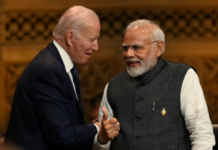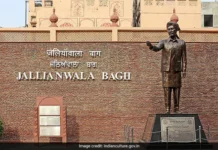NEW DELHI: Ahead of the Glasgow climate change summit, Denmark Prime Minister Mette Frederiksen on Saturday said that India is keen to take responsibility for the issue of ‘Green transition’ in the country and the rest of the world.
“Last year Prime Minister Narendra Modi and I signed and agreed on a green strategic partnership. We see an ambitious Indian government who wants to take great responsibility when it comes to green transition in India and the rest of the world,” said Denmark PM.
“I am very glad to have a cooperation about the Green transition. In a few weeks from now, COP26 Glasgow is coming up and we also hope that we can use this meeting on how to support the rest of the world,” she added.
Danish PM arrived in New Delhi on Saturday for her 3-day visit to India. She was received by the Minister of State (MoS) for External Affairs Meenakshi Lekhi, at Delhi airport. Later, PM Modi received Mette Frederiksen at the Rashtrapati Bhavan in Delhi, where she was accorded a ceremonial welcome. She also paid tribute to Mahatma Gandhi at Rajghat.
External Affairs Ministry spokesperson Arindam Bagchi said the Danish PM’s visit is an opportunity to review and further the India-Denmark Green Strategic Partnership. Frederiksen will call on President Ram Nath Kovind and hold bilateral talks with Prime Minister Modi. She will also interact with think tanks, students and members of civil society.
India termed Mette Frederiksen’s visit very important as she is the first head of state visiting India since COVID-19 restrictions are in place since last March. External Affairs Minister Dr S Jaishankar also visited Denmark earlier this year.
India and Denmark have strong trade and investment ties. More than 200 Danish companies are present in India and over 60 Indian companies have a presence in Denmark.
There exists strong collaboration in the fields of renewable energy, clean technologies, water and waste management, agriculture and animal husbandry, science & technology, digitisation including ICT, smart cities, shipping, etc. (ANI)







